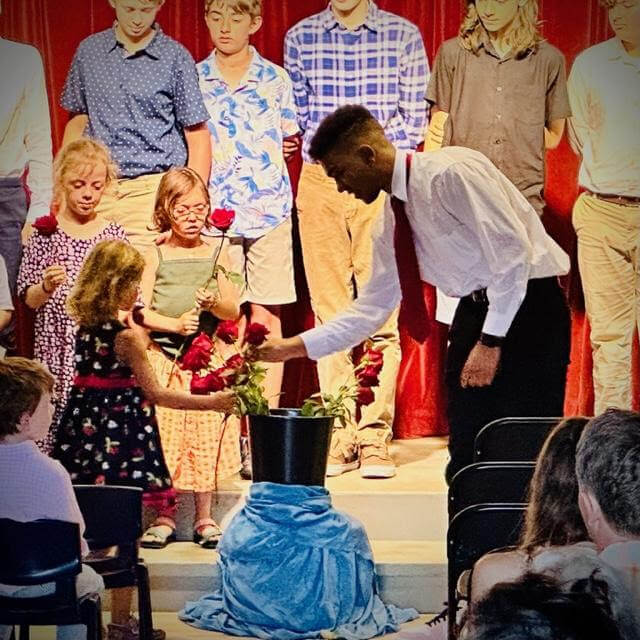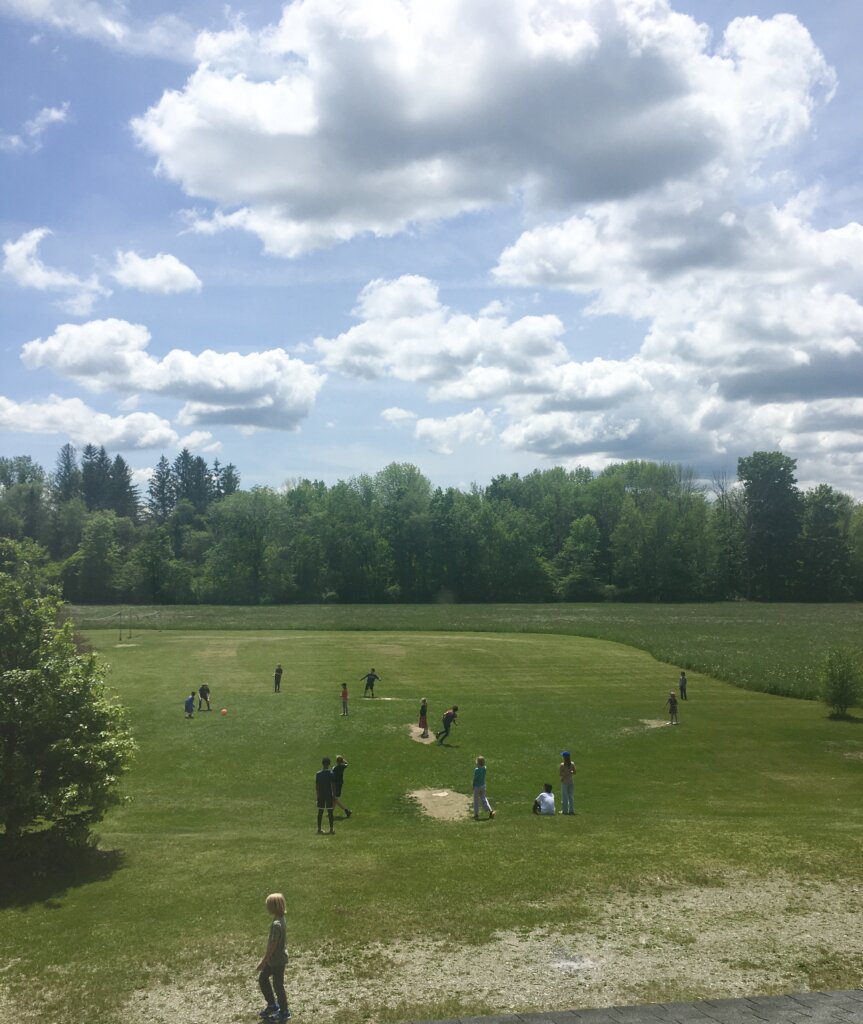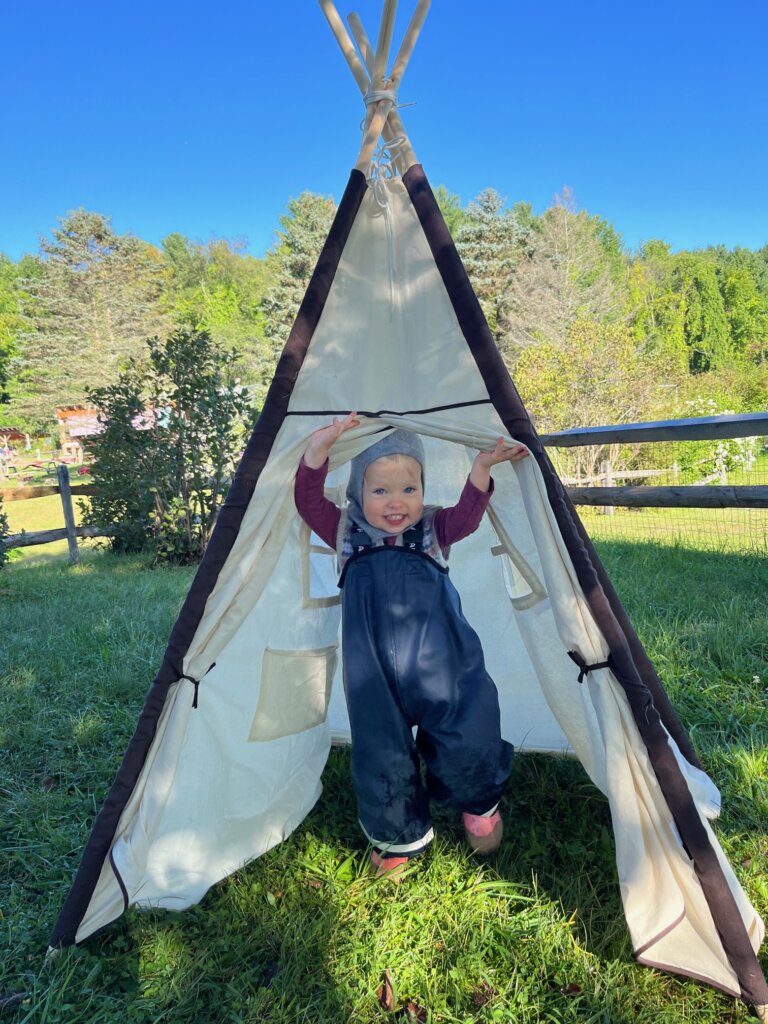Sharing the Solar Eclipse with Young Children
Sharing the solar eclipse with young children offers a rare opportunity to help your child learn that they can stay safe and grounded, even when something extraordinary happens.
Learning Through the Senses
For the young child, every day is a celebration.
Young children experience the world through their senses. They feel the light and warmth of the sun through their bodies. They marvel at the sun’s power to wake up plants and birds, chase the clouds away and peel off our winter coats.
Celebrate the Good
In Early Childhood classes at Berkshire Waldorf School, we celebrate all that’s good in the world: the beautiful light of the sunrise, food prepared with so much care, the children’s community of loving family, the safe embrace of Mother Nature, and so much more.

Instead of Explaining…
In our modern world, we focus on the scientific, material aspect of things. We tend to understand phenomena like a solar eclipse through intellectualized explanations. However, giving children rational explanations prematurely can contribute to confusion, anxiety and hypervigilance. It pulls little ones out of the developmental space where the world makes sense to them because they can experience it with their senses. The sages of old knew to meet events like this with the same wonder and reverence as other cosmic events.
Waldorf Education founder Rudolf Steiner writes about how children’s feelings during such moments are the same as what we could call “religious feelings” in an adult.
Focus on Experience
So instead of looking up during the time of the eclipse, how about we look down?
I invite you to tap into your inner quiet during the time of the eclipse, and observe your children and nature. How does the light and the mood change? Look for shadows and light. How are your pets behaving? And what about the other animals that might live in your backyard? The crows, the geese? Are the birds singing? Are the bees buzzing? How do the flowers and trees change? Is your child getting a bit clingy, or are they oblivious to what is happening in nature? Let the experience resonate without a verbal explanation.
Highlight with Gratitude
We can take this opportunity to give gratitude to the Sun and the Moon for sharing their light with us. How about planting some flowers for the bees, who are sometimes called “light workers”? Sunshine soup for dinner? Moon cakes (aka pizza or tortillas)? How about a candle for the moon and a candle for the sun, to give thanks for their life-giving light? These are just a few thoughts to fuel your imagination.
A solar eclipse is so much more than one celestial body passing in front of the other and blocking the light, it’s an opportunity to share the wonder of the world with our children.

PIE! Parent Info Events START 11/29
You’re invited for some special PIE (parent info events, aka parent education), on the menu at BWS between Thanksgiving & Holiday Break! We are grateful to be together, in the spirit of learning and community. Bon apetit!

Waldorf 101: How, When & Why Waldorf Education Works
Wednesday, Nov. 29 | 6:00-7:00 p.m.
Join experienced Berkshire Waldorf School teachers Alessandra Profumo and Lynn Arches for an inspiring overview of how, when and why Waldorf teachers bring the “3 Rs” to students in ways that create lasting learning and meaning, not just rote memorization.


Free; all welcome. We will meet in person in the school library. Bring your questions! Bring a friend! Adults only, please.
*PRO TIP: For real insight, we invite you to experience the school in action at our “Coffee, Tea and Tour” the same morning, WED 11/29, or the following week, WED 12/6, starting in the Library (Grades School building), from 8:30-9:30 a.m. For more info or to register, email Admissions Director Robyn Coe at admissions@berkshirewaldorfschool.org.
Since You Asked: Why We Do What We Do
Friday, Dec. 1 | 8:30-9:30 a.m.
Join veteran teacher and Berkshire Waldorf School Council of Teachers Chairperson Krista Palmer for a conversation about how BWS teachers meet the whole child, according to Rudolf Steiner’s indications on child development.
Mrs. Palmer will give an overview and answer your questions about the incarnating child from birth through adolescence, continuing her primer (begun at our “Looking Forward to the Grades” meeting in November) around the “Whys” of Waldorf Education and the philosophical understanding BWS teachers work from. Don’t miss this!


Winter Tips & Tools for Prevention and Wellness
Monday, Dec. 4 | 4:30 – 5:30 p.m.
Join licensed acupuncturist, Berkshire Waldorf School alum and Board member Emily Kasten to learn basic acupressure, Chinese medical massage techniques, plus simple herbal and kitchen remedies for immune support, wellness and recovery.
First Days of School
Beginning our 52nd school year with the traditional Rose Ceremony marks the first key transition our First Graders make, as Eighth and Twelfth Graders welcome them into the Grade School.

First Days of First Grade
First Graders begin the school year with a Main Lesson block in Form Drawing. This three-week block introduces straight and curved lines, which are the basis for all the letters and numbers students will learn over the course of the year. It’s how drawing organically becomes writing and all four mathematical operations. BWS and BWHS students build on this strong foundation over their twelve years of Elementary and High School starting right here, in the first week of Grades School!
The Class Teacher presents fairy tales and stories from all over the world, teaching in a form that children already know, love and understand, through stories. She creates living pictures using both movement and imagination, without notes or screens. The children listen transfixed, then each child carefully draws a form from the story into their very own main lesson book.
First Graders practice making straight and then curved lines. Next, they incorporate the straight and curved lines together, creating a new form. At last, the focus turns to learning to draw a spiral, as the children first practice walking a spiral, forming it on the ground with rope, as well as drawing on each other’s backs!

Becoming a Class
So much of First Grade is about learning to become a community. At Berkshire Waldorf School, the class will move together through the Grades, and frequently on through High School, so relationships, belonging and etiquette are an important part of education. Notably, in Waldorf Education, this social learning is part of the curriculum in both academic and subject classes.
As an example of social learning in First Grade, Class Teacher Victoria Cartier discussed the importance of building up the basics (already well-established in BWS Early Childhood classes). This is what Waldorf teachers call “form”: learning to walk in a line, work together in a circle, attend to the teacher–all the ways their experiences teach the children how to work and play together, help one another and take care of the space they share.
Ms. Cartier spoke about the development of the children from Kindergarten to First Grade.
The transition from Kindergarten to First Grade is crossing a bridge, a critical passage as students’ energy slows down and they are able to learn internally, become aware of their feelings and access a deeper ability to produce, express and generate their internal thoughts and memories, without relying on sensory reminders.
-First Grade Teacher Victoria Cartier
Ms. Cartier also emphasized not taking for granted just how new everything is for students brand new to the Grades School, and how much growth and change is occurring within them. In First Grade, Games period and recesses are organized by Ms. Cartier, while the afternoons are reserved for free play. During free play, the teacher has time to observe social dynamics, and discover students’ different affinities, strengths and joys, when they are free to explore, climb and play whatever calls to them. The strength of the class as a whole shines through during this time.

The Very First Days of School
Our youngest Early Childhood students in the Star Room (Toddler), Rose Room and Robin’s Nest (2-4 years), and Sun Room, Rainbow Room and Pumpkin Patch Kindergartens (5-6 years) started school with surprisingly few tears. Some children had their very first experience of being away from parents and regular caregivers. We were delighted to see and hear them playing, running, visiting the sheep, climbing trees, singing and laughing. It’s wonderful to have our youngest students back on campus!
Welcome dear families, to this learning and growing community.







